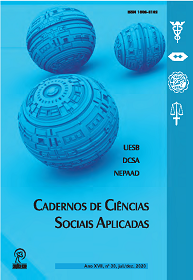Self-fulfilling prophecy and the new normal postcoronavirus
DOI:
https://doi.org/10.22481/ccsa.v17i30.7140Keywords:
Corona virus; Covid-19, Self-fulfilling prophecyAbstract
Based on evidence gathered in the literature, this investigation took as a theoretical starting point the proposition that speculations can become self-fulfilling. Therefore, there would be merit in studying the most current speculations, of a social and economic order, associated with the coronavirus that plagues the country - the stated objective of this work: part of the future may be being built by the consumption of these forecasts. Subordinating the work to the subjective conception of reality, this was conformed as qualitative, descriptive, cross-sectional, documentary, which used materials about the Novo Normal published in the Folha de São Paulo newspaper as a source of data that were treated and passed through content analysis. It was concluded that there is a significant set of speculative matters that only use Novo Normal as an anchor to offer propositions that would be on the agenda even without the pandemic, for example, the socio-environmental agenda or the intensified use of bicycles. As a rule, speculations are inaccurate, without the concern of offering timelines. They are technically questionable when they do not consider relevant and probable scenarios, such as the discovery of the vaccine and effective treatments or the pandemic's upsurge due to the emergence of a more contagious and lethal disease. But, regardless of such objections, such speculations cannot be dismissed, as they are being aired and may become a fact, not because they are a priori right, but because people can mark their behavior on them.
Downloads
References
BERGER, P. L.; LUCKMANN, T. The social construction of reality: a treatise in the sociology of knowledge. New York: Randon House, 1966.
BRIGGS, M. Cap.13 Self-fulfilling prophecy. In: HEDSTRÖM. P; BEARMAN, P. S. (ed.). The Oxford handbook of analytical sociology. New York: Oxford University Press, 2011.
FURBER, S. The future of computer technology and its implications for the computer industry. The Computer Journal, v.51, n. 6, p.735-740, 2008.
GAEREMYNCK, A.; WILLEKENS, M. The endogenous relationship between audit-report type and business termination: evidence on private firms in a non-litigious environment. Accounting and Business Research, v. 33, n.1, p.65-79, 2003.
JUSSIM, L. Self-fulfilling prophecy. In: Encyclopædia Britannica, 2020. Disponível em www. britannica.com /contributor/Lee-Jussim/9782908, acesso em 06.07.2020.
MARTI, E.; GOND, J-P. When do theories become self-fulfilling? Exploring the boundary conditions of performativity. Academy of Management Review, v. 43, n.3, 19p. 2018.
MERTON, R. K. The self-fulfilling prophecy. The Antioch Review, v. 8, n. 2 (Summer), p. 193-210, 1948.
PETALAS, D. P.; SHIE, H.; VETTEHEN, P. H. Forecasted economic change and the self-fulfilling prophecy in economic decision-making. PLoS ONE, v. 12, n. 3, 13p., 2017.
ROSENTHAL, R.; JACOBSON, L. Pygmalion in the classroom. New York: Holt, Rinehart and Winston, 1968.
SANT, R. ZAMAN, M. A. Market reaction to Business Week 'Inside Wall Street' column: a self-fulfilling prophecy. Journal of Banking & Finance, v. 20, s/n., p. 617-643, 1996.
WAN, Y.; YANG, X An empirical study of the self-fulfilling prophecy effect in Chinese stock market. The Journal of Finance and Data Science, v.5, s/n, p. 116-125, 2019.
Downloads
Published
How to Cite
Issue
Section
License
Copyright (c) 2020 Cadernos de Ciências Sociais Aplicadas

This work is licensed under a Creative Commons Attribution-NonCommercial 4.0 International License.






